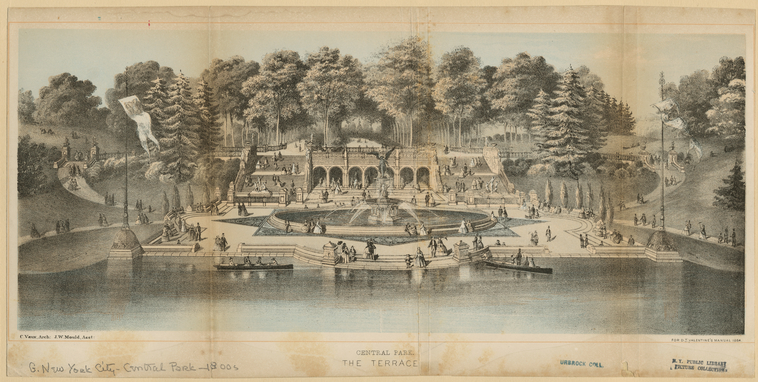NYC Neighborhoods
Jacob Wrey Mould: Architect of Central Park and Lyricist
 Angel of the Waters Fountain and Bethesda Terrace, Central Park, New York City - photograph by Ahodges7, used under Creative Commons license from Wikipedia
Angel of the Waters Fountain and Bethesda Terrace, Central Park, New York City - photograph by Ahodges7, used under Creative Commons license from Wikipedia
Each week for many years, Christopher Gray has written the Streetscapes column for the Sunday edition of the New York Times, focusing on out-of-the-way stories of curiosity, beauty, endangered and rescued architectural examples in New York. His writings prompt one to stop, look, and reflect on the details of craftsmanship that have been put into the city and elsewhere.
This past week’s column (Jan. 16) focused on the Sheepfold—the building formerly known as Tavern-On-The-Green in Central Park’s Sheep Meadow. (It's literally down the street—65th Street—from The New York Public Library for the Performing Arts.)
Although Frederick Law Olmstead and Calvert Vaux usually receive the most credit for its design, one of Central Park's overlooked architects is Jacob Wrey Mould (1825-1886). Gray has been very good at bringing attention to Mould, mentioning him many times in the past years. It's easy to see Mould's distinctive decorative details on the Terrace, its centerpiece Bethesda Fountain, Belvedere Castle, and other noted 19th century Central Park structures in which he participated. (Compare the photograph above with its design below.) 
 Beethoven, Fidelio. Vocal score published by Boosey, 1851, translated by Jacob Wrey Mould
Beethoven, Fidelio. Vocal score published by Boosey, 1851, translated by Jacob Wrey Mould
I thought it might be intriguing to see how his lyrics stand up today. The Music Division has a few of his opera translations, so I examined Mould’s translation for Beethoven’s Fidelio, in particular Leonore’s Act 1 aria Abscheulicher. Here it is, beginning at the slow part at Komm, Hoffnung, lass den letzten Stern (the literal translation being “Come, hope, let the last star”):
[Komm, Hoffnung]The snowdrop peeps beside the rose,Their native worth unblightedOn this fond bosom both resposeTrue Love with Hope united.[Ich folg’ demm innern Triebe]Their balmy grateful duty,Gives courage life,And bids the wifeFulfil her sacred duty.
For my taste, it sounds rather archaic. To his credit, Mould's explains in his introduction to this vocal score (dated April 23, 1851): "For ourselves, we beg indulgence, having been hampered and tied in by ungainly metres and irregular lines in many places..." Clearly, the libretto to Beethoven's opera gave him problems.
 Pasqualino Brignoli's "Vieni o bella in ciel la luna" translated by Jacob Wrey Mould (with the composer's signature above the caption)
Pasqualino Brignoli's "Vieni o bella in ciel la luna" translated by Jacob Wrey Mould (with the composer's signature above the caption)Lo! The moon above us beamingBathes in light you lakelet shore,There the starry heaven gleamingWith effulgence spans us o’er:Let our hearts, aye let our hearts this happy moment,Nature’s boundless rapture share,Come, love, ah! come!
Operas translated by Jacob Wrey Mould:
Songs translated by Jacob Wrey Mould:
Read E-Books with SimplyE
 With your library card, it's easier than ever to choose from more than 300,000 e-books on SimplyE, The New York Public Library's free e-reader app. Gain access to digital resources for all ages, including e-books, audiobooks, databases, and more.
With your library card, it's easier than ever to choose from more than 300,000 e-books on SimplyE, The New York Public Library's free e-reader app. Gain access to digital resources for all ages, including e-books, audiobooks, databases, and more.
If you don’t have an NYPL library card, New York State residents can apply for a digital card online or through SimplyE (available on the App Store or Google Play).
Need more help? Read our guide to using SimplyE.
Comments
Olmsted's name is misspelled
Submitted by fran quittel (not verified) on October 31, 2017 - 3:00pm